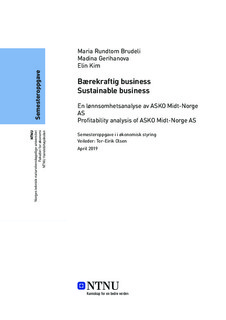Bærekraftig business
| dc.contributor.advisor | Olsen, Tor-Eirik | |
| dc.contributor.author | Brudeli, Maria Rundtom | |
| dc.contributor.author | Gerihanova, Madina | |
| dc.contributor.author | Kim, Elin | |
| dc.date.accessioned | 2019-06-17T14:00:34Z | |
| dc.date.available | 2019-06-17T14:00:34Z | |
| dc.date.issued | 2019 | |
| dc.identifier.uri | http://hdl.handle.net/11250/2601091 | |
| dc.description.abstract | Sammendrag Overordnet tema i denne studien er bærekraftig business. Formålet med denne studien er å rette fokuset mot bærekraftig business ved å se på lønnsomhetsutviklingen til ASKO Midt-Norge AS som følge av de tiltakene bedriften har iverksatt for å redusere klimagassutslippene i sin virksomhet. Temaet belyses ved hjelp av relevant teori innenfor områdene regnskapsanalyse og strategisk analyse. Med utgangspunkt i dette er følgende problemstillinger formulert: Hvordan har lønnsomheten utviklet seg for ASKO Midt-Norge AS i perioden 2013-2017? Har ASKO Midt-Norge AS bedret lønnsomheten i perioden 2013-2017 som følge av de investeringene bedriften har iverksatt for å redusere klimagassutslippene i sin virksomhet? For å besvare problemstillingene er det gjennomført beregninger av ulike nøkkeltall og foretatt et intervju med ledelsen i ASKO Midt-Norge AS. Vi har benyttet både kvantitativ og kvalitativ metode. Studien ble gjort som en enkeltcase-studie fordi vi ønsket å belyse hvilke forhold som har påvirket de valgene og den utviklingen ASKO Midt-Norge AS har hatt i femårsperioden. Resultatene fra studien viser at ASKO Midt-Norge AS har hatt en positiv lønnsomhetsutvikling i undersøkelsesperioden. Nøkkeltallene viser en sterkere økning fra 2016 til 2017 som i all hovedsak skyldes NorgesGruppens tilbakekjøp av dagligvarekjeden Bunnpris. Vi har ikke god nok dekning i våre data til å uttale oss om lønnsomheten til ASKO Midt-Norge AS har blitt bedre som følge av de investeringene bedriften har iverksatt for å redusere klimagassutslipp i sin virksomhet, siden det ikke er så mange år siden investeringene ble gjennomført. Gjennom vår studie kan vi likevel si at de tiltakene og investeringene ASKO Midt-Norge AS har iverksatt har fått mange fordeler for bedriften, slik at de har blitt mer innovasjonsfremmende og har fått økt oppmerksomhet fra deres interessenter. Selv om lønnsomhetsanalysen til ASKO Midt-Norge AS ikke viser store utslag som følge av de grønne investeringene de har foretatt i perioden, vil vi likevel påstå at ASKO Midt-Norge AS driver med bærekraftig business siden de fokuserer på å oppnå profitt i et langsiktig perspektiv. | |
| dc.description.abstract | Abstract The theme of this bachelor thesis is sustainable business. The purpose of the study is to examine how the profitability of ASKO Midt-Norge AS has developed as a result of investments the company has made with the purpose to reduce their greenhouse gas emissions, in relation to sustainable business. The subject is studied drawing on relevant theory within the fields of financial statement analysis and strategic analysis. Based on this, the main problems to be addressed in the study was: How has the profitability of ASKO Midt-Norge AS developed during the period 2013-2017? Has ASKO Midt-Norge AS improved its profitability during the period 2013-2017 as a result of the investments the company has implemented with the purpose to reduce greenhouse gas emissions in its operations? To address the main problem we have calculated several key financial figures and conducted an interview with the management of ASKO Midt-Norge AS, using both quantitative and qualitative methods. We wanted to shed light on factors that have affected the development that ASKO Midt-Norge AS has had during the period, and therefore conducted a case study. The result from the study shows that the profitability of ASKO Midt-Norge AS has had a positive development during the period. The key financial figures show a significant increase from 2016 to 2017 due to NorgesGruppen acquisition of the grocery chain Bunnpris. Based on our analysis, we are not in position to say that the profitability of ASKO Midt-Norge AS has increased solely due to the investments the company has made with the purpose to reduce greenhouse gas emissions in its operations, because it is not many years since the investments was initiated. Results from the study indicate that the investments ASKO Midt-Norge AS have made have resulted in several benefits for the company, such as increased attention from their stakeholders and becoming more innovative. Even though the analysis of the company´s profitability does not show significant changes as a result of the investments they have made during the period, we will still claim that ASKO Midt-Norge AS runs a sustainable business because the company is focusing on achieving profit in the long run. | |
| dc.language | nob | |
| dc.publisher | NTNU | |
| dc.title | Bærekraftig business | |
| dc.type | Bachelor thesis |
Tilhørende fil(er)
Denne innførselen finnes i følgende samling(er)
-
NTNU Handelshøyskolen [1623]
